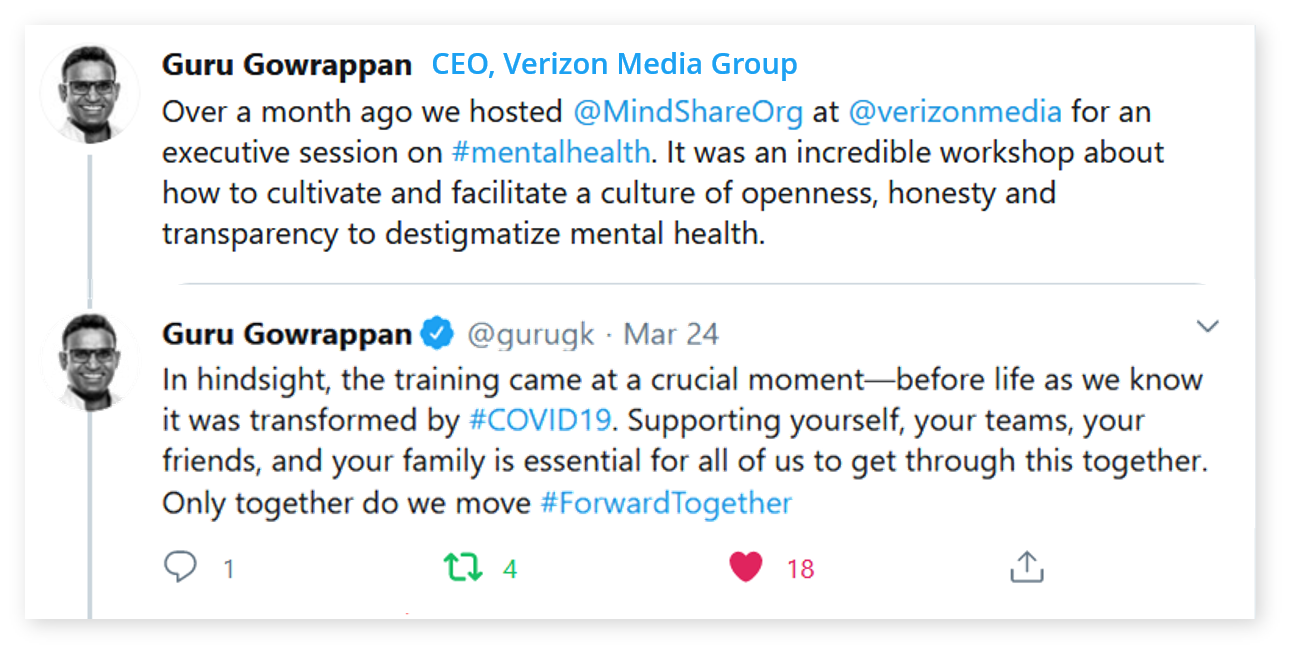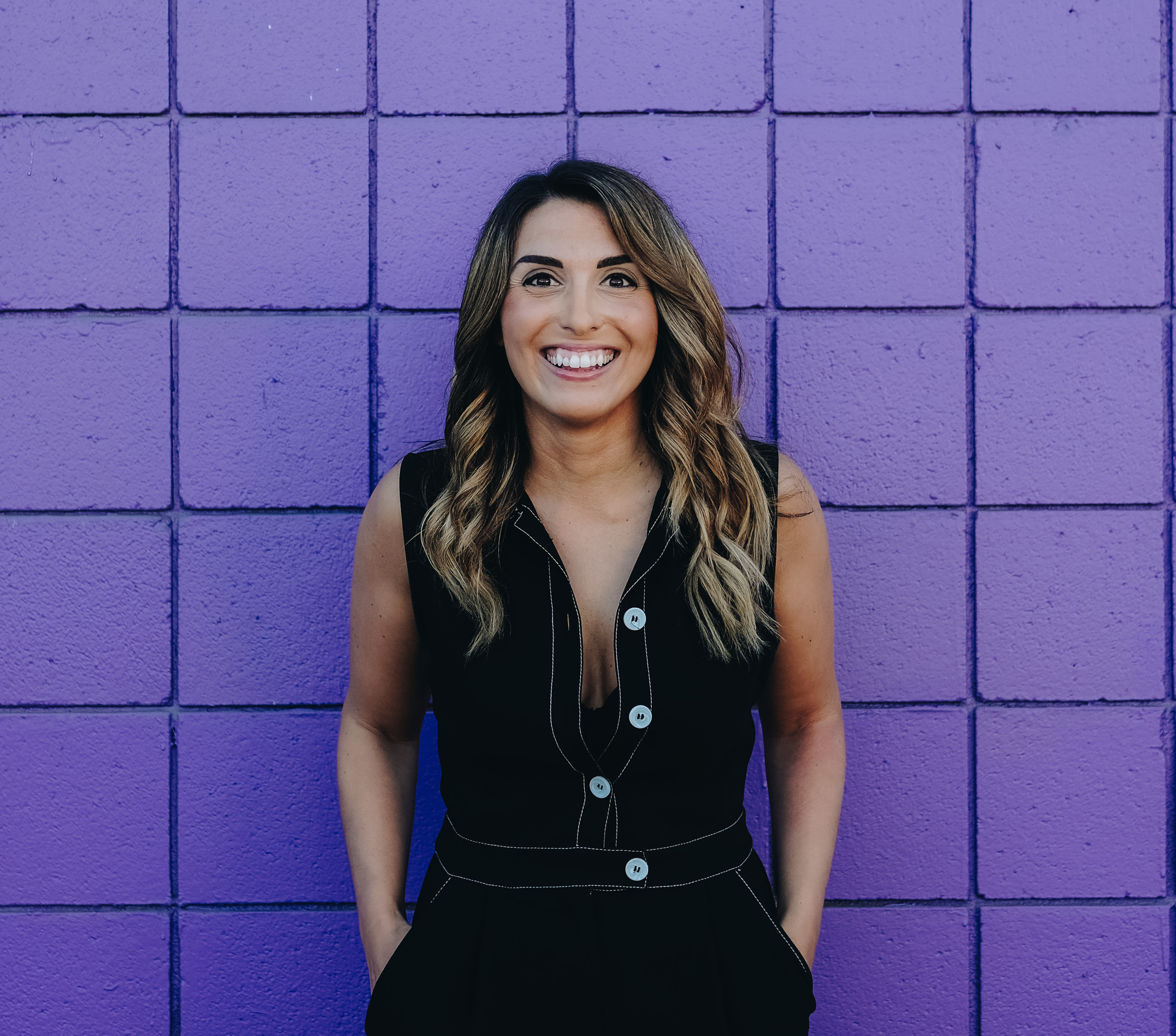It’s time to finally address the mental health crisis in America, and more businesses than ever before are prioritizing the mental health of their workforce. While the U.S. had been experiencing a mental health crisis long before the pandemic, 2020 has made the crisis unmissable—including in the workplace.
Earlier this year, a study conducted in partnership among Qualtrics, SAP, and Mind Share Partners found that a little over 40% of respondents (two out of every five employees) shared that their mental health has declined since the COVID-19 outbreak. As we are well into October with no clear end to the pandemic insight, the effects of the pandemic have potentially long-lasting consequences for our mental health.
Companies are responding by bolstering their mental health efforts internally, including creating or expanding long term mental health and wellness strategies. On October 15, 2020, Mind Share Partners is joining forces with Make A Difference events to bring a premier virtual workplace mental health conference to the U.S. called “Make A Difference Summit US in association with Mind Share Partners” to address the changing needs of this workforce. Here are examples from leaders at top companies across the U.S. that have innovated the way they support employee mental health in 2020. Each of the leaders featured in this article will be speaking at the summit mentioned above. If you want deeper insights, check out the summit details here.
Grassroots efforts can destigmatize mental health with leadership’s support
YouTube’s Chief Mental Health Advisor, Jessica DiVento Psy.D. shared, “To help destigmatize the conversation around mental health, Google’s peer-to-peer mental health community, Blue Dot, has mobilized during COVID-19 to set up a virtual listener network for Googlers who might need an empathic ear. Blue Dot is a peer to peer listening program that was started as a grassroots effort by employees that Google leadership supported with more infrastructure to grow the program and provide training for listeners.
Grassroots initiatives like peer programs and ERGs for mental health are a component of a broader movement of culture change for mental health at work. They thrive when they receive both top-down and bottom-up support companywide.
DiVento also shared how Google has partnered with its internal ERGs for their feedback and input on some of the unique challenges they and their families face. DiVento highlights some of the initiatives that happened as a result.
“We developed a mental health information hub with all things coronavirus-related, like techniques for managing stress and burnout. We created an easier way for employees to find providers of color through their EAP. We also brought in guest speakers to discuss the specific intersection of mental health, well-being and race to help employees explore their experiences and find effective ways to cope with challenging and stressful situations.”
Leaders must normalize and model changing workplace norms
In 2019, the global law firm Morrison & Foerster (MoFo) decided to focus on mental health. MoFo partnered with workplace mental health nonprofit, Mind Share Partners, to lead a global effort to build a solid foundation of workplace mental health awareness and skills. An important part of this effort included leadership’s commitment to normalizing workplace mental health. One way MoFo did this was by implementing Executive Team Sessions led by Mind Share Partners with the firm’s most senior leaders to align on why mental health matters at MoFo and the unique role of leaders.
What does this look like in action? Stacey Sprenkel, a partner at MoFo, shared in a Harvard Business Review article that she modeled new norms by “proactively telling her teams that she was working odd hours because of her childcare responsibilities and invited them to share what they needed to work best during the pandemic.” Leading by example allows employees to feel safer in suggesting accommodations and embracing these new work norms.
Ongoing leadership commitment is the key to lasting culture change
In a Linkedin post on World Mental Health this past week, Verizon Media Group’s CEO, Guru Gowrappan shared, “At Verizon Media, we are committed to driving greater awareness and creating a mentally healthy culture through education and open dialogue.” Before the pandemic, Verizon Media was already convening senior leaders to discuss their role in creating a mentally healthy culture in an executive session in partnership with Mind Share Partners. Gowrappan shared on Twitter that the session had helped Verizon leaders be better prepared to support employee mental health during the coronavirus pandemic.

Verizon Media has a long term plan for mental health within and outside of their organization. Gowrappan shared,
“At Verizon Media, we create mental health initiatives with our stakeholders in mind — our employees, customers, shareholders and communities. For example, we launched Wellness Fridays with experts offering deep-dive virtual guidance and meditation sessions for employees, along with mandatory mental health training for all personnel. We’re supporting consumers through trusted news content like the recently launched Yahoo Life, a news site dedicated to mental health/wellbeing education, news and resources. To support communities at large, we’ve donated $10 million in advertising inventory to support mental- and public-health response efforts for COVID-19.”
Communicating support and resources is vital
Danielle Shanes, the NBA’s Head of Benefits & Wellbeing shared in an interview with Make A Difference Media, “Our program’s success is dependent on our communications. With such a diverse workforce, we all have different needs. It’s crucial that employees know what’s available to them, so we’re constantly exploring opportunities to communicate. Shanes also shared the importance of addressing stigma, and ensuring accessibility to resources globally. Their global program is available to employees in thirteen countries on five continents, and recently launched Mind Health, the NBA’s internal mental health and wellness platform.
Shanes shared,
“I attribute the growth in our program to a couple of things. The first is accessibility – resources were not previously available in many countries, and we pushed our vendors to innovate and try new things with us. Second is confronting the stigma—it can be taboo in many cultures to speak about mental health and feelings, so when players like Kevin Love and DeMar DeRozan publicly spoke about their struggles, people around the world, including our international employees, were able to see an example of it being OK to talk about mental health.
Reinforce mental health benefits and resources with stories
Dr. Ollie Malone is the VP of HR at Dallas Fort Worth Airport in Texas and is responsible for its 60,000 workers. Dr. Malone shared in an interview with Make A Difference Media that DFW Airport has had long-standing mental health support counseling available to all of its employees, covered through their employee benefits program. As a result of the pandemic, Dr. Malone shared, “we recently initiated a program that includes employees who may not be covered under our company benefits but who, nevertheless, are available for mental health support through this benefit which is separate from our other health benefits.”
The company is also embracing the power of storytelling. Dr. Malone attests that the most effective aspect of their workplace mental health and wellbeing program has been the very open and honest discussion of the topic with their senior leaders. “Our CEO modeled the effective addressing of these challenges by openly discussing some of the issues that he has faced with members of his family. The straightforward, level-headed, and compassionate way in which he spoke about this topic set the pace for others’ conversations.”
Dr. Malone also shares their future plans to incorporate storytelling to reduce stigma.
“We are in the process of releasing videos where employees speak about their personal journeys during the coronavirus: dealing with their own illness, the illness of friends and relatives, and the need to balance many areas of their lives as a result of the virus”.
You can learn more from these leaders at Make A Difference Summit US in association with Mind Share Partners.


